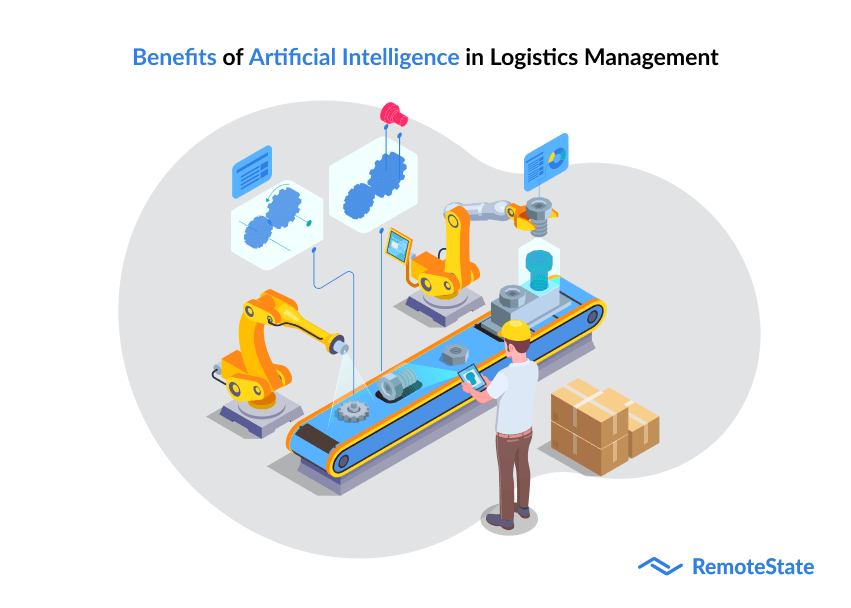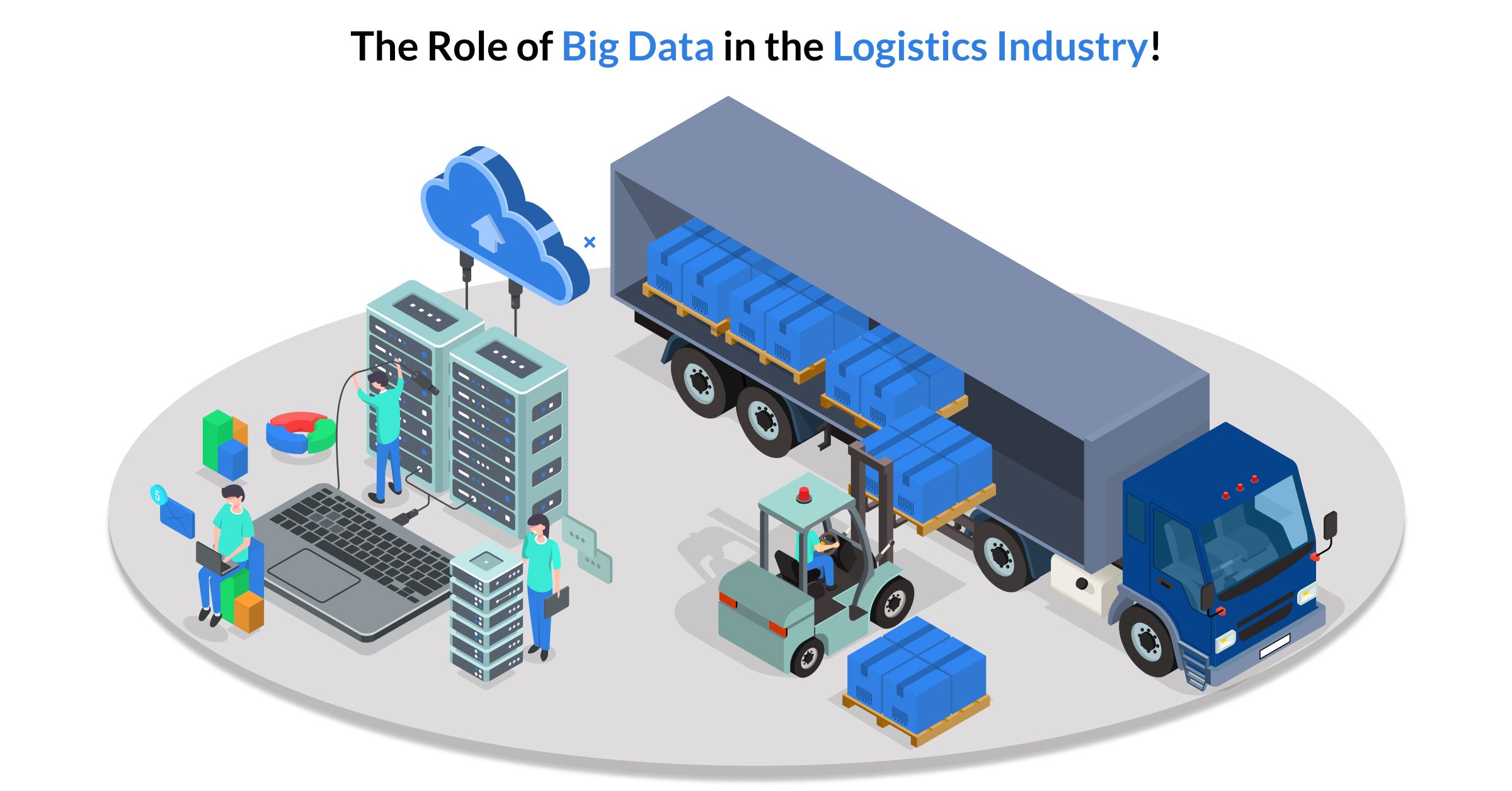Introduction
Logistics management is a complex and demanding task, with numerous variables to consider, such as transport routes, inventory levels, and customer demand.
Logistics management is a complex and demanding task, with numerous variables to consider, such as transport routes, inventory levels, and customer demand.
It involves a wide range of activities, including planning, implementing, and controlling the movement of goods from point of origin to point of consumption. With the advent of artificial intelligence (AI), logistics management has become easier, more efficient, and more accurate. AI has the potential to revolutionize logistics management, making it more streamlined and cost-effective.
In this blog post, we will discuss the role of artificial intelligence in logistics management, including its benefits, challenges, and opportunities.
Benefits of Artificial Intelligence in Logistics Management

Predictive Analytics
One of the primary benefits of AI in logistics management is predictive analytics. AI can analyze large amounts of data from multiple sources, including weather reports, traffic patterns, and customer demand, to predict future trends. This allows logistics managers to make more informed decisions about inventory levels, transport routes, and delivery schedules. Predictive analytics also helps companies to optimize their supply chain, reducing costs and improving efficiency.
Route Optimization
AI can optimize transport routes, ensuring that goods are delivered quickly and cost-effectively. It can take into account factors such as traffic patterns, road conditions, and delivery schedules to determine the most efficient route. This not only saves time and money but also reduces the carbon footprint of logistics operations.
Automation
AI can automate many of the repetitive tasks involved in logistics management, such as data entry and tracking. This frees up time for logistics managers to focus on more strategic tasks, such as supply chain optimization and customer service.
Enhanced Customer Service
AI can improve customer service by providing real-time information on delivery schedules and inventory levels. This allows logistics managers to proactively manage customer expectations and respond quickly to any issues that arise.
Challenges of Artificial Intelligence in Logistics Management
Integration
One of the biggest challenges of AI in logistics management is integration with existing systems. Many logistics companies have invested heavily in their current technology infrastructure and may be hesitant to adopt new AI-based systems. Integrating AI with existing systems requires careful planning and execution to ensure that the new technology is compatible and does not disrupt existing operations.
Data Quality
AI relies heavily on data, and the quality of the data can have a significant impact on its effectiveness. Inaccurate or incomplete data can lead to incorrect predictions and decisions. Logistics companies need to ensure that their data is clean, accurate, and up-to-date to get the most benefit from AI.
Cost
Implementing AI in logistics management can be expensive, particularly for smaller companies. The cost of developing and implementing AI-based systems can be prohibitive, and logistics companies need to carefully consider the return on investment before investing in AI.
Opportunities of Artificial Intelligence in Logistics Management
Supply Chain Optimization
AI can optimize supply chain operations, reducing costs and improving efficiency. By analyzing data from multiple sources, AI can identify bottlenecks and inefficiencies in the supply chain and provide recommendations for improvement. This can help logistics companies to reduce inventory levels, improve delivery times, and optimize transport routes.
Enhanced Visibility
AI can provide real-time visibility into logistics operations, allowing logistics managers to track shipments and inventory levels. This can help companies to proactively manage inventory levels, reducing the risk of stockouts and improving customer service.
Improved Decision Making
AI can provide logistics managers with data-driven insights, allowing them to make more informed decisions. This can help logistics companies to optimize their operations, reduce costs, and improve customer service.
Conclusion
Artificial intelligence has the potential to revolutionize logistics management, making it more streamlined, efficient, and cost-effective. By leveraging the power of AI, logistics companies can optimize their supply chain operations, improve customer service, and reduce their environmental footprint.
However, there are also challenges associated with the implementation of AI in logistics management, including integration with existing systems, data quality, and cost. Despite these challenges, the opportunities presented by AI in logistics management are significant, and companies that embrace this technology are likely to gain a competitive advantage.
Streamline Your Logistics Management with AI-powered Solutions from Remotestate
Remotestate offers AI-powered solutions to streamline logistics management. With their expertise in AI and machine learning, Remotestate can help logistics companies optimize their supply chain operations, reduce costs, and improve customer service.
Their AI-powered solutions can help logistics managers make data-driven decisions by providing real-time visibility into logistics operations. Remotestate's predictive analytics can help logistics companies anticipate demand, optimize transport routes, and reduce inventory levels.
Remotestate can also help logistics companies automate repetitive tasks, freeing up time for logistics managers to focus on more strategic tasks. Their solutions can track shipments, manage inventory levels, and provide real-time information to customers on delivery schedules.
In conclusion, Remotestate's AI-powered solutions can help logistics companies optimize their supply chain operations, reduce costs, and improve customer service. With its expertise in AI and machine learning, Remotestate is well-equipped to help logistics companies embrace the power of AI and stay ahead of the competition.
FAQ's
What is logistics management?
Logistics management involves planning, implementing, and controlling the movement of goods from point of origin to point of consumption.
What is artificial intelligence?
Artificial intelligence (AI) is a branch of computer science that focuses on creating intelligent machines that can learn and perform tasks that typically require human intelligence, such as recognizing speech, making decisions, and solving problems.
How can AI improve logistics management?
AI can improve logistics management by providing predictive analytics, optimizing transport routes, automating repetitive tasks, and enhancing customer service.
What are the challenges of implementing AI in logistics management?
The challenges of implementing AI in logistics management include integration with existing systems, data quality, and cost.
What are the opportunities for implementing AI in logistics management?
The opportunities for implementing AI in logistics management include supply chain optimization, enhanced visibility, and improved decision-making.
Publication Date
2023-03-30
Category
Logistics
Author Name
Sajal Nehra


